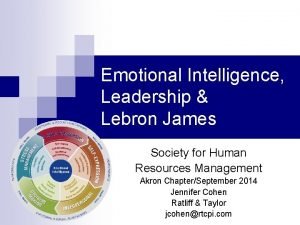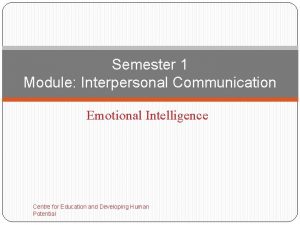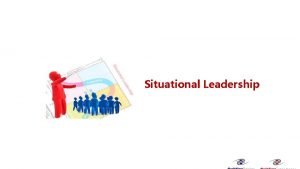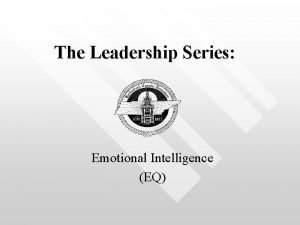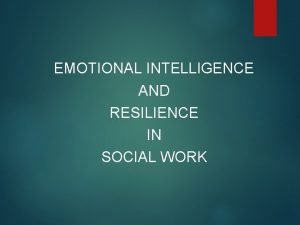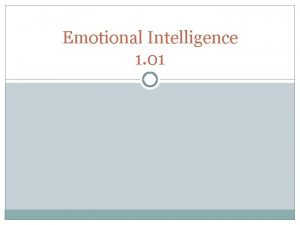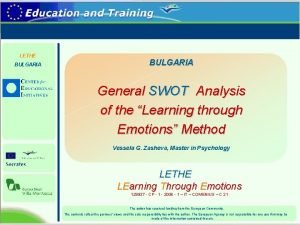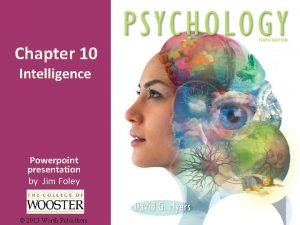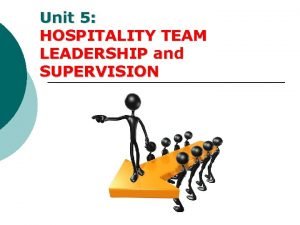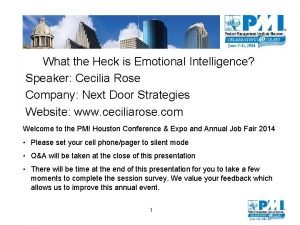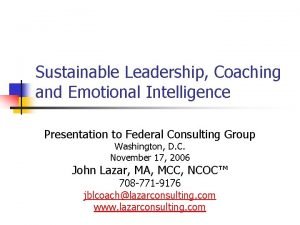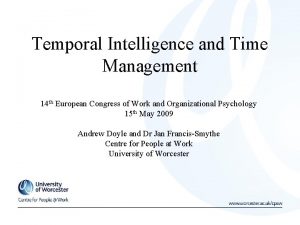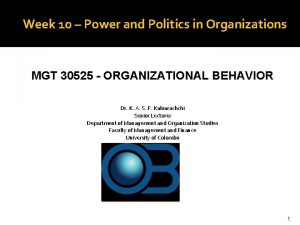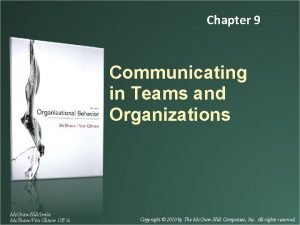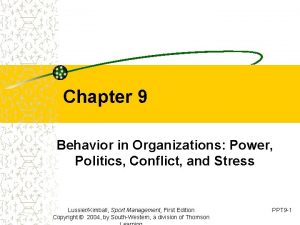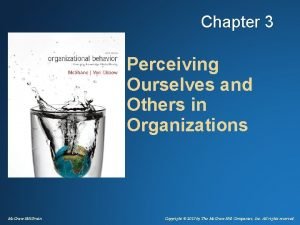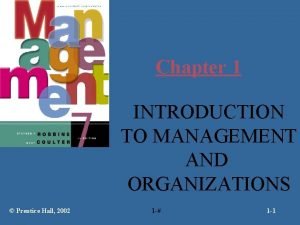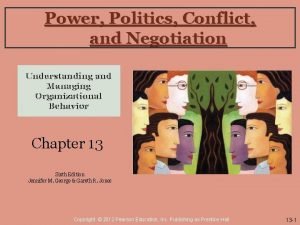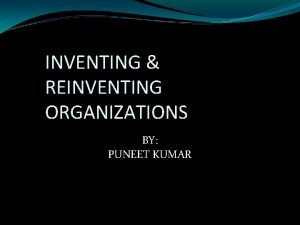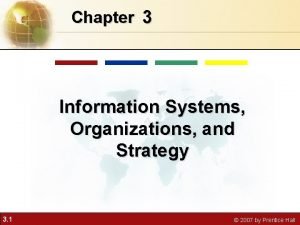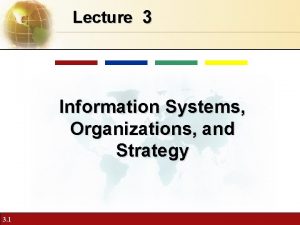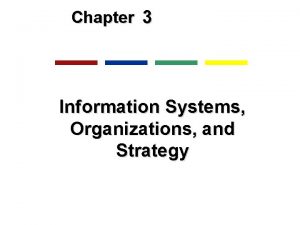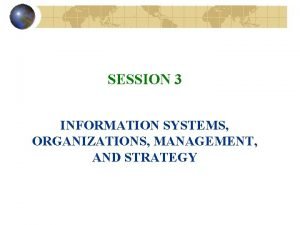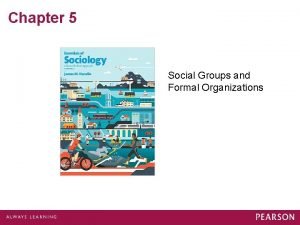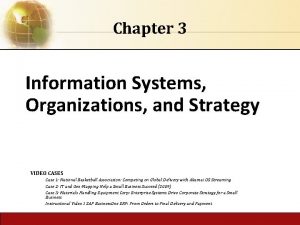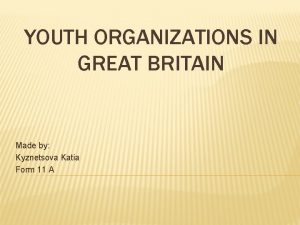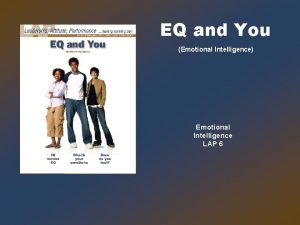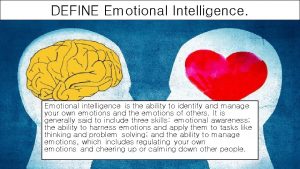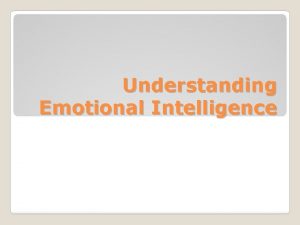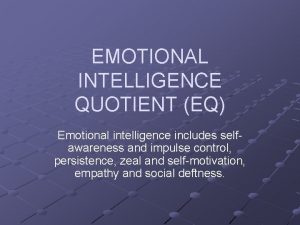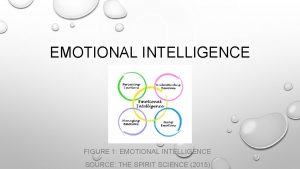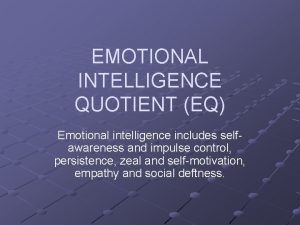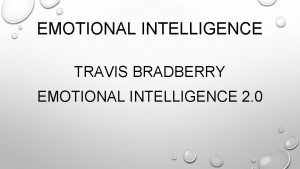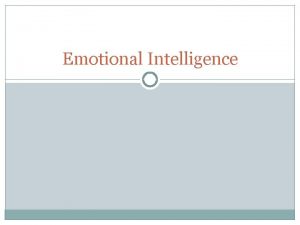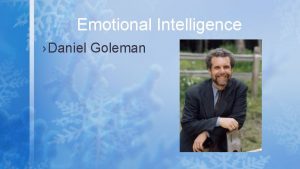Emotional Intelligence In Leadership and Organizations Emotional Intelligence




















































- Slides: 52

Emotional Intelligence In Leadership and Organizations


Emotional Intelligence The capacity for recognizing our own feelings and those of others, for motivating ourselves, for managing emotions well in ourselves and in our relationships. Daniel Goleman

Emotional Intelligence Unlike IQ, which is basically the same throughout life, Emotional Intelligence based competencies are learned abilities.

Emotional Intelligence skills account for close to 90% of what distinguishes the most outstanding performers or leaders from average ones. The ‘trick’ is identifying and understanding the gaps between your self assessment and those of others.

In a study of 2, 000 managers from 12 large organizations, 81% of the competencies that distinguished outstanding managers were related to emotional intelligence. Boyatzies (1982)

Domains of Emotional Intelligence The very word EMPATHY seems unbusinesslike, out of place amid the tough realities of the marketplace. Daniel Goleman

People look to a leader to provide supportive, emotional connections – for empathy.

When leaders drive emotions positively, they bring out the best in others. We call this effect RESONANCE. When they drive emotions negatively, leaders spawn DISSONANCE.

Resonance People feel “in synch”. A leader may manage, but they do not lead without a healthy dose of heart.

Key to creating resonance is competency in emotional intelligence – HOW leaders handle themselves and their relationships.

Good Moods = Good Work Research reveals that a well timed joke or playful laughter can: §Stimulate creativity. §Open lines of communication. §Enhance a sense of connection and trust. §Make work more fun.

Laughter signals the group’s EMOTIONAL TEMPERATURE offering one sure sign that peoples’ hearts as well as their minds are engaged.

Cheerfulness and warmth spread most easily while depression spreads hardly at all.

Rudeness ü Rudeness is contagious; grumpy workers serve customers poorly. ü Distress makes people less emotionally intelligent. ü Leaders who spread bad moods are bad for business.

Dissonance ü Dissonance is an unpleasant, harsh sound – refers to lack of harmony. People feel continually “off key”. ü Occurs when the leader is out of touch with the people in the room.

Dissonance ü Dissonance dispirits people, burns them out, sends them packing. ü It creates a toxic environment and people take the toxicity home.

Dissonance ü Dissonance can range from the obvious tyrant who bawls out and humiliates people to the “dementors” who unwittingly drain hope and happiness out of those around them. ü “Dementors” may be successful short term, but they leave behind a toxic environment.


Dissonance When 108 managers reported on causes of conflicts in their jobs, the number one reason was inept criticism by a boss.

Dissonance My observation of managers/executives in general: 1. 80% of us treat others LESS THAN what they really are. We don’t do it all the time, but we do it too often. 2. 18 -19% treat others pretty much AS THEY ARE. We are quick to point out their faults to them and others about them. 3. 1 -2% treat others BETTER THAN they really are. They treat them the way they OUGHT TO BE and THEREBY HELP THEM BECOME WHAT THEY ARE CAPABLE OF BEING.

Domains of Emotional Intelligence There are four domains of emotional intelligence: 1. Self Awareness 2. Self Management 3. Social Awareness (empathy) 4. Relationship Management

Domains of Emotional Intelligence Self Awareness § Self confidence § Perhaps the most telling sign of self awareness is a propensity for self reflection and thoughtfulness. § Self deprecating sense of humor.

Emotionally intelligent managers like to be in a room with smart people. Those who aren’t emotionally intelligent want to be the smartest person in the room.

Domains of Emotional Intelligence Self Management § § Self Control Achievement Initiative Optimism

Domains of Emotional Intelligence Self Management § No leader can afford to be controlled by negative emotions such as frustration and rage or anxiety. § Frees us from being a prisoner of our feelings. § Leaders who can stay optimistic and upbeat even under intense pressure radiate positive feelings and create resonance.

Domains of Emotional Intelligence Ultimately, the most meaningful act of responsibility that leaders can do is to control their own state of mind.

Domains of Emotional Intelligence Social Awareness § Empathy is the number one ingredient of social effectiveness in the workplace. § They seem approachable. § They listen carefully. § They respond appropriately.

Observation You control three things: ü What you think ü What you say ü How you behave

Domains of Emotional Intelligence Social awareness is empathy; it’s not ‘I’m OK, You’re OK’. It means taking employees’ feelings into thoughtful consideration and then making intelligent decisions that translates those feelings into a response.

Evidence of Social Awareness ü Expertise in building and retaining talent. ü Cross cultural sensitivity. ü Service to clients and customers.

Domains of Emotional Intelligence Relationship Management ü Motivate with a compelling vision ü Influence through persuasion ü Conflict resolution ü Teamwork and collaboration ü Develop others

Domains of Emotional Intelligence Relationship management is friendliness with a purpose, moving people in the right direction, whether it is an agreement, or marketing strategy or enthusiasm about a new project.

Leadership Styles That Create Resonance Visionary Moves people toward dreams when change requires a new vision. Coaching Affiliative Connects what a person wants with organizational goals. Connects people to each other. Democratic Values peoples’ input and gets commitment.

Two Styles That Create Dissonance 1. PACESETTING (use sparingly) – Leader holds high standards for performance – is obsessive about doing things better and faster Can leave employees feeling pushed too hard and leaders appear to not care about people they are ‘driving’

Pacesetter ü Exceptionally high standards. ü Impatient with poor performance. ü Readiness to take over for people when they get into difficulties. (use when employees are self-motivated, highly competent and need little direction).

Dissonance Styles BY COMMAND (Do it because I say so). Rarely uses praise and freely criticizes employees. These types of bosses are becoming dinosaurs. These SOBs may survive for a long time. They may achieve financial goals but have no regard for long term, human or organizational costs. Al Dunlop was a classic user of this style

‘Chainsaw Al’ Gets Cut Sunbeam’s corporate cutthroat shown the door USA Today – 6/16/98

Commanding Style These “leaders” drive away talent. The number one reason people cite for quitting is dissatisfaction with the boss. Those with bad bosses are four times more likely to leave than those who appreciate the leader they work for.

Great managers play chess while average managers play checkers. From “What Great Managers Do”

CEO Disease – The information vacuum around a leader created when people withhold important (and usually unpleasant) information.

CEO Disease ü The higher up the “ladder” a leader climbs, the less accurate his or her self-assessment is likely to be. ü “The last time I was told what was really happening was the day before I became president of the Texas Methodist Hospital” – Larry Mathis. ü Most people overestimate their abilities, but the very poorest exaggerate their abilities the most. ü “Bill is ignorance on fire”.

Leaders and Learning Old leaders can learn new tricks and can make life-altering changes in their styles.

Stop Sense Drill Sacrifice See

Attention is the Currency of Leadership

Leaders And Learning Self-Directed Learning Process ü Ideal self – What do I want to be. ü Real self – What am I (my strengths and gaps). ü My learning agenda – build on strengths and reduce my gaps. ü Experiment and practice new behaviors and thoughts and feelings. ü Develop supportive and trusting relationships that make change possible.

Leaders and Learning The best kind of learning agenda helps you focus on what you want to become – your own ideal rather than someone else’s idea of what you should be.

Leaders and Learning Practice to become your ideal self. Rehearse new behavior at every opportunity until it becomes automatic. Athletes spend a lot of time practicing and a little time performing. Executives spend no time practicing.

Building one’s emotional intelligence can not – will not – happen without sincere desire and concerted effort. Daniel Goleman

Drill ü In your daily conversations, ask questions rather than making statements. ü Keep stories about yourself to three or four sentences.

Most leaders aren’t suffering because they cannot SOLVE their problems; they are suffering because they cannot SEE their problems.

 Global leadership foundation emotional intelligence test
Global leadership foundation emotional intelligence test Transformational vs transformative leadership
Transformational vs transformative leadership Attitude and emotional intelligence
Attitude and emotional intelligence Interpersonal communication and emotional intelligence
Interpersonal communication and emotional intelligence Adaptive leadership characteristics
Adaptive leadership characteristics Situational leadership vs adaptive leadership
Situational leadership vs adaptive leadership Ihhp eq test
Ihhp eq test Oka emotional intelligence
Oka emotional intelligence Master aptitude
Master aptitude Emotional intelligence index
Emotional intelligence index Emotional intelligence happiness
Emotional intelligence happiness Emotional intelligence flowchart
Emotional intelligence flowchart Emotional intelligence training materials
Emotional intelligence training materials What is emotional resilience in social work
What is emotional resilience in social work Golemans emotional intelligence
Golemans emotional intelligence Tows mátrix példa
Tows mátrix példa Emotional quotient
Emotional quotient Advantages of emotional intelligence
Advantages of emotional intelligence Emotional intelligence in hrm
Emotional intelligence in hrm Emotional intelligence ppt
Emotional intelligence ppt Evolution of emotional intelligence
Evolution of emotional intelligence Blueeq emotional intelligence
Blueeq emotional intelligence Conclusion of emotional intelligence
Conclusion of emotional intelligence Evolution of emotional intelligence
Evolution of emotional intelligence Cecilia rose lap
Cecilia rose lap Emotional intelligence presentation
Emotional intelligence presentation High emotional intelligence
High emotional intelligence Conclusion of emotional intelligence ppt
Conclusion of emotional intelligence ppt Emotional intelligence journal
Emotional intelligence journal Aptimore coaching
Aptimore coaching Advanced emotional intelligence
Advanced emotional intelligence Kecerdasan kepemimpinan
Kecerdasan kepemimpinan Temporal intelligence in leadership
Temporal intelligence in leadership Power and politics in organizations
Power and politics in organizations Voluntary health and welfare organization examples
Voluntary health and welfare organization examples Compare and contrast business organizations
Compare and contrast business organizations Formal groups fulfill both and functions in organizations.
Formal groups fulfill both and functions in organizations. Communicating in teams and organizations
Communicating in teams and organizations Power, politics and conflict in organizations
Power, politics and conflict in organizations Perceiving ourselves and others in organizations
Perceiving ourselves and others in organizations Introduction to management chapter 1
Introduction to management chapter 1 Csusm clubs and organizations
Csusm clubs and organizations Conflict power and politics
Conflict power and politics Physical property of ammonia
Physical property of ammonia Inventing and reinventing organizations
Inventing and reinventing organizations Information systems organizations and strategy
Information systems organizations and strategy Information systems, organizations, and strategy
Information systems, organizations, and strategy Information systems, organizations, and strategy
Information systems, organizations, and strategy Cultures and organizations software of the mind
Cultures and organizations software of the mind Information systems organizations and strategy
Information systems organizations and strategy Social groups and formal organizations
Social groups and formal organizations Chapter 3 information systems organizations and strategy
Chapter 3 information systems organizations and strategy Youth organizations in great britain
Youth organizations in great britain
